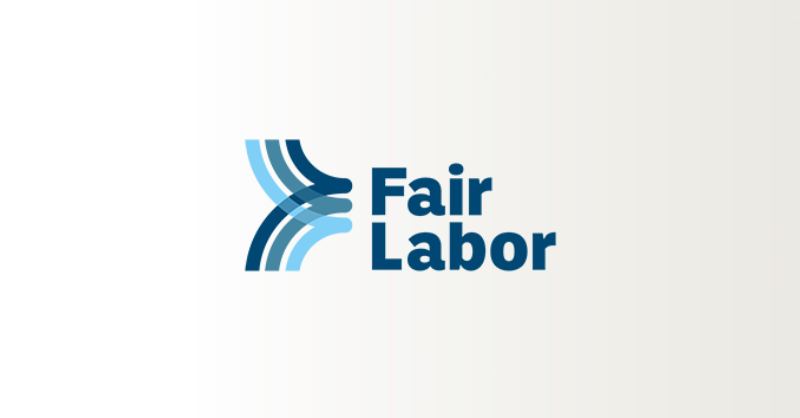Information on Migrant Worker Responsible Recruitment Schemes/Certification Programmes – Where Are We At Nowadays? Any Progress? (UPDATED 16th Jan 2024)
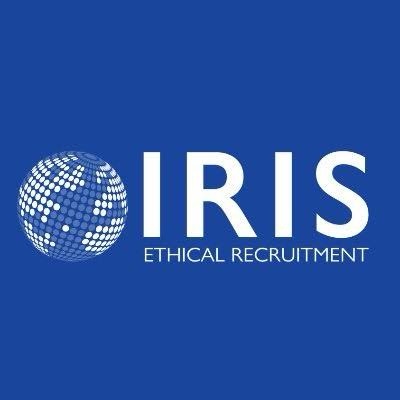
This blog post provides readers with some basic and useful background information on migrant worker related responsible recruitment schemes and certification programmes in existence internationally at this time.
The article is intended to recap on where we are nowadays and whether there has been any significant progress forward in the creation of an ‘ethical recruitment’ market to protect migrant workers and prevent forced labour risks from arising.
Recruitment of migrant workers is an important global issue in light of the significant role played by migrant workers in global supply chains and the extreme risks of forced labour that result from migrant worker’s unethical, illegal and exorbitant recruitment processes.
Ethical recruitment is about much more than workers not paying for their recruitment themselves (employer pays model where an employer covers recruitment related costs and fees), as outlined in principle one of the Dhaka principle for migration with dignity.
Ethical recruitment is also about worker informed consent, ethics, confidentiality and many more things too. See also the ILO’s definition of recruitment related fee and costs, and related support literature.
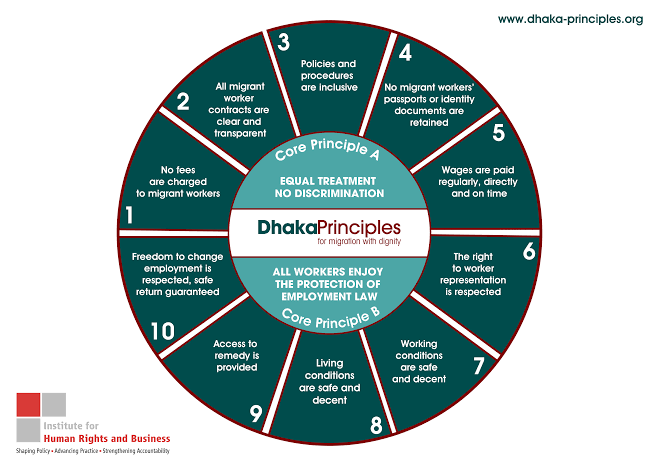
The blog post concludes that despite significant international focus, funding and commitments globally to advance ethical recruitment by many parties, there has been limited progress in the systematic certification of manpower or recruitment agencies as ethical in the past decade or more by any of the key actors working in this area, nor by any of the schemes.
More concerningly, most of the few agencies that have been certified so far as ‘ethical’ report little to no benefit to their business operations since their certification.
Perhaps an exception to this is the recent On The Level (OTL) Programme by the Fair Hiring Initiative outlined below that has certified 2 Myanmar and 1 Nepali (qualified for certification) agencies as ethical, and is currently certifying another 9 Nepali agencies (as of Jan 2024)
We have a long way to go still in ensuring the ethical recruitment of migrant workers and the development of an ethical recruitment market globally.
There are four main migrant worker-responsible recruitment accreditation schemes that currently exist internationally:
- The FAIR Hiring Initiative (TFHI) – On The Level (OTL) Certification Program (updated Jan 2024)
- Clearview Accreditation Scheme.
- International Organization for Migration’s (IOM) International Recruitment Integrity System (IRIS) Accreditation Scheme.
- The Responsible Business Alliance’s (RBA) Responsible Recruitment Programme (RRP) or Responsible Labour Initiative (RLI) Accreditation Scheme (update Jan 2024)
1. The FAIR Hiring Initiative (TFHI) – On The Level (OTL) Certification Program
The FAIR Hiring Initiative (TFHI) is a Philippines-registered non-profit organization that states that it develops, tests, and promotes global ethical recruitment models and technologies. TFHI also addresses issues of forced labor, debt, bondage, and human trafficking in labor migration through training, applied research, and technical advice.

From 2012 to 2017, TFHI ran a recruitment agency that served as a laboratory for ethical recruitment practices. TFHI has since focused on consulting and training businesses to create ethically-based labor and supply chains.
TFHI has an On The Level (OTL) Certification Program for recruitment and labour agencies. OTL is a private recruitment and employment agency certification/recognition program supported by a comprehensive framework of cross-border recruitment principles and standards.
The OTL Principles and Standards of Ethical Recruitment are at the program’s core. Each Principle is accompanied by a set of Standards that outlines the prescribed practices that aspiring agencies must faithfully adhere to in their undertaking for the OTL certification. These guiding principles and standards should establish a robust foundation, ensuring that agencies operate with integrity and uphold the highest ethical standards throughout their recruitment endeavors.
Which recruitment agencies received OTL Certification?
TFHI has worked alongside and been a recipient of considerable funds from IOM, ILO, RBA, and most other actors working in this area for many years in its attempts to advance ethical recruitment work.
Since 1999 onwards THFI has worked alongside the Seafood Taskforce in Thailand in a large funded Programme to certify Cambodian and Myanmar recruitment agencies supplying workers to Thailand’s seafood companies.
Despite many agencies taking part in this OTL project, it seems only three agencies (2 Myanmar, 1 Nepali) have been certified under the OTL standard so far, even after many years of activities. 9 Nepali agencies are under certification. The 1 Nepali agency is listed as ‘qualified for certification’ only.
According to its website site, TFHI states: From 2019 to 2021, TFHI, with support from Humanity United, implemented On The Level, a certification program for agencies, in the Myanmar to Thailand recruitment corridor. TFHI partnered with the Seafood Task Force, which enrolled eight Myanmar recruitment agencies to OTL.
In August 2019, eight agencies, represented by owners and key staff, completed the Ethical Recruitment Appreciation Course, scored “strong evidence of learning” in the training evaluation, and showed commitment to complete the program components. Seven out of eight trained agencies proceeded with the program, completed self-assessment, and underwent on-site assessment.
In March 2020, TFHI met with each agency to present audit findings and recommendations for corrective action. Six agencies showed a willingness to improve and responded to TFHI’s recommendations. With additional support from Nestlé, TFHI developed the Systems Improvement Program or the “improvers program” for agencies to receive coaching and training to better prepare them for certification.
TFHI recognizes that each agency has made improvements, in varying degrees, to their respective internal systems. Unfortunately, due to the COVID-19 health crisis and the political situation in Myanmar, TFHI is unable to conduct verification measures to determine if an agency should receive certification.
Each agency’s status can be viewed in the Improvers Program Matrix, which will be updated when certification activities can resume and progress can be verified.
TFHI commits to supporting these six pilot agencies to complete OTL certification activities as soon as possible.
Alpha World Link and International Focus Lead the Way
Original Source: OTL News
On May 10, 2022, TFHI hosted an induction ceremony awarding OTL Certification to Alpha World Link and International Focus, two recruitment agencies from Myanmar enrolled in the OTL program in 2019. These agencies’ attainment of the OTL Certification for the Myanmar to Thailand corridor demonstrates, THFI stated, their commitment to ethical recruitment practices and served as a testament to their resilience in overcoming the challenges of a global pandemic and political disruptions.
The significance of the OTL certification program extends beyond individual agencies, THFI claims. It is vital to raise awareness of ethical recruitment practices within global supply chains. By mapping an easily accessible list of agencies that adhere to the employer pays principle and other good practices, OTL helps migrant workers identify trustworthy agencies using a set of recruitment standards explicitly developed to promote fair recruitment practices.
“We call on companies’ decision makers to adopt and enforce this model and work only with labor suppliers who commit to meeting legal requirements and social standards, such as OTL standards,” said Daw Wint Wint Aung, Managing Director of Alpha World Link.
Expanding on the same sentiment, U Nyi Lin Htet, Marketing Director of International Focus, added, “It’s important for the agencies to have the support of employers and for the employer to keep an open mind when negotiating service agreements.”
These statements highlight the significance of collaboration between agencies and employers to establish practices that benefit all stakeholders, especially workers. By emphasizing the need for employer support, the agencies underscore the importance of fostering a mutually beneficial relationship.
1. Alpha World Link
Alpha World Link Co., Ltd was established on the 20th of September 2005 as company registration No. 105857462 (Former No.1243/2005-2006) under the Ministry of National Planning and Economic Development. Alpha World Link Co., Ltd is one of the General Services Companies and is an overseas employment agency registered at the Department of Labour of the Ministry of Immigration, Labour Employment and Social Security.
Alpha World Link Company states that it performs overseas services per the Laws relating to overseas Employment, Rules, and Regulations. Alpha World Link Co., Ltd claims it is practicing the Ethical Recruitment Policy (Zero Recruitment Fees) to workers, employers, and all parties concerned throughout the recruitment process.
Alpha World Link Website: here.
2. International Focus Recruitment Agency Myanmar – can be found here.
International Focus provides Employment Agencies.
Location: 153, 2nd Flr., Seikkantha St., Kyauktada.Tsp, Yangon
Updated TFHI Activities (January 2024)
From 2023, THFI started a new pilot project funded apparently by Dyson and Woolworths to train and accredit Nepali manpower agencies for the Nepal-Malaysia migration corridor. No public statements accompanied the project start-up until January 2024, but the Thailand Myanmar/Cambodia project seems to have ended.
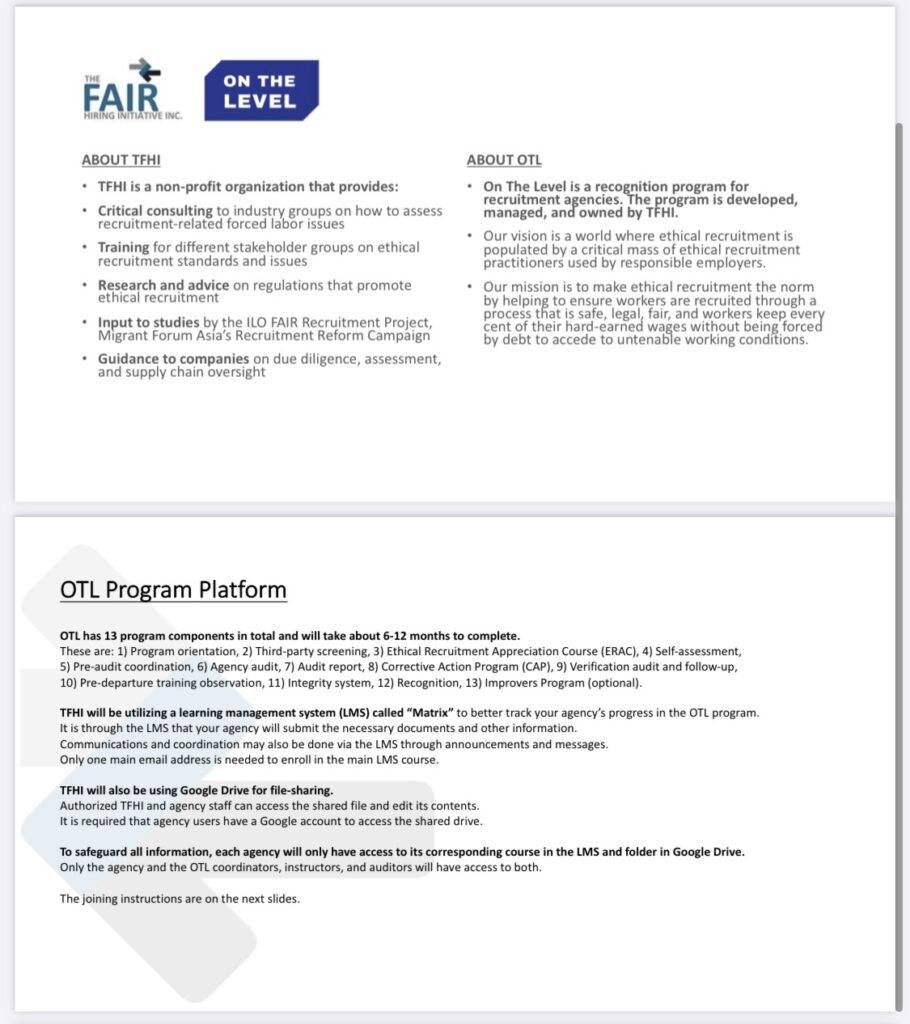
Some manpower agencies are fully funded or sponsored through the Nepal Programme, and others have to pay their own fees to THFI OTL to be part of the scheme and to gain accreditations, reportedly stated to be around US$8,000 per agency.

Concerningly, there is no evidence that the Myanmar agencies first accredited with OTL have received any business benefit from their accreditation by THFI’s OTL so far. Both agencies report less business than before certification, suggesting the certification process has not been accompanied by the development of an ethical recruitment market.
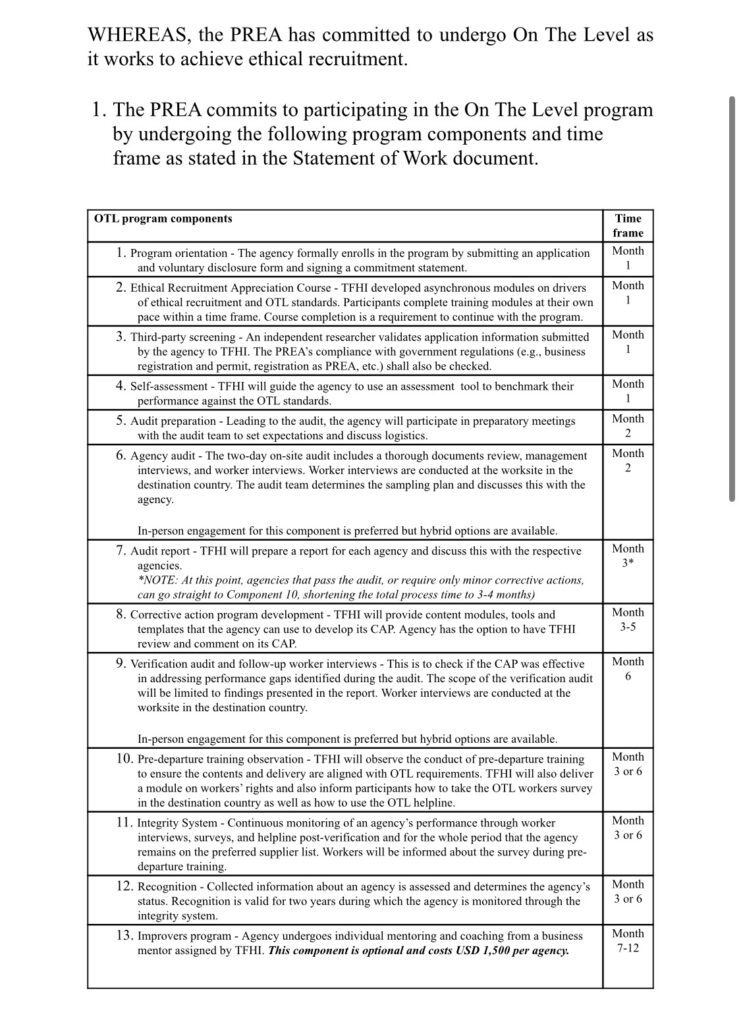
OTL NEWS January 11th 2024
10 Nepal agencies complete initial OTL components – https://www.fair-hiring.org/otl-news
January 11, 2024 – The Fair Hiring Initiative (TFHI) is developing an accessible list of agencies that brands and companies can use to develop their own “preferred labor supplier list” for their supply chain partners. Ten agencies have completed initial On The Level (OTL) program components including an assessment and are implementing corrective actions to comply with OTL standards. One agency, International Manpower Recruitment (IMR), has completed a second audit and has qualified for certification (see IRIS section below for more information on IMR)
The OTL list will be shared among brands and companies that have added their recruitment agencies to be vetted for the list, and each participating company and recruitment agency becomes part of what TFHI envisions will be a growing community of ethical recruitment practitioners.
To qualify for certification, agencies must demonstrate conformance to OTL standards, including OTL’s definition of recruitment fees and costs. For IMR and other agencies aspiring to be certified, they must also consent to continuous monitoring through worker interviews and surveys also known as the OTL integrity system. Furthermore, agencies must meet OTL’s requirements for pre-departure training including allowing the OTL team and/or partners to introduce workers to the OTL integrity system.
Companies that use recruitment agencies in countries like Nepal play a huge role in an agency’s decision to improve the quality of its recruitment services. Recognition for ethical practices is most useful for a recruitment agency when it brings business opportunities from companies that pay for recruitment costs. Increase in business is the key motivator for recruitment agencies to embrace ethical practices and leave behind more profitable but unethical (even illegal, in some cases) business models. It strengthens the business case for ethical recruitment when business begins to move towards vetted ethical labor suppliers and helps to mainstream ethical practice throughout the industry.
Brands that urge their manufacturing and materials suppliers to pay for recruitment costs and to use only vetted ethical agencies are also key to growing the ethical recruitment market. Using systems like OTL as an integral element of its supplier due diligence, supply chain monitoring, and decision criteria on whether a company should continue to work with a labor supplier or not drives change in recruitment practices.
2. Clearview Accreditation Scheme
The Clearview accreditation scheme is a global social compliance certification scheme for labor providers.
Clearview is a global responsible recruitment certification program that enables certified labor recruiters and labor providers to demonstrate that they operate at the highest standards in their sourcing and supply of workers. The Clearview audit process evaluates the recruitment and working conditions faced by temporary, seasonal, and migrant workers in labor supply chains.
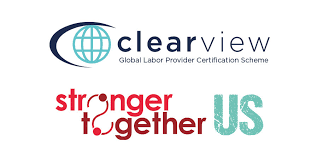
To achieve certification, a supposedly rigorous independent audit of its recruitment management systems is required. A US-based audit body, trained and licensed in the Clearview methodology, assessed the U.S. agencies certified under the scheme across a set of technical standards and control points developed by industry experts and mapped against leading international and national practices and standards such as the IOM International Recruitment Integrity System (IRIS) code of conduct, the ILO Fair Recruitment initiative, the Institute of Business and Human Rights Dhaka Principles and Employer Pays Principle, Ethical Charter on Responsible Labor Practices, and the UN Guiding Principles on Business and Human Rights
Clearview is a business-driven program that claims it is harmonizing a best practice methodology to deliver a shared, consistent, and global approach for the assurance and continuous improvement of safe and ethical working conditions of workers supplied by labour providers in domestic and global supply chains.
Stronger Together engaged Clearview
FLC certification program: Clearview US is Stronger Together’s global social compliance certification program for labor providers to recognize and differentiate themselves in the market as responsible recruiters. Find out more
Stronger Together NGO is an impact-driven, not-for-profit organization providing businesses with practical training, resources, business services, and collaborative programs to create a world where all workers are recruited responsibly and have fair work free from exploitation.
Stronger Together offers:
1. Capacity-building guidance, resources, webinars, and training.
2. Country, sector, and thematic collaborative supply chain programs.
3. Monitoring, evaluation, and market differentiation tools.
4. Bespoke consultancy, advisory, and training services.
The Stronger Together NGO works across multiple sectors and countries, combining established international standards and methodologies with innovative solutions to drive effective human rights due diligence in global supply chains. Whilst they focus on practical and systemic business solutions and work closely with response and remedy providers, civil society organizations, law enforcement, and government, they always keep the job seekers and workers for whom they want to make a difference at the heart of what they do.
Stronger Together US – Responsible Recruitment Programme for Agriculture
Stronger Together’s multi-stakeholder collaborative program seeks to motivate the U.S. fresh produce sector to recognize and reward responsible recruitment, thereby boosting the supply of ethically sourced labor and reducing risks for workers and businesses across the labor supply chain. Read more here.
Who Received Clearview Certification?
1. AgriLabor and AgSocio are the First FLCs to Achieve Clearview Certification
Stronger Together US announced Oregon-based AgriLabor and California-based AgSocio as the first farm labor contractors (FLCs) to achieve Clearview Certification in the US.
Clearview’s global certification program recognizes FLCs in the US for operating responsibly, professionally, legally and ethically in their sourcing, supply, and management of workers. Clearview evaluates the recruitment and working conditions faced by temporary, seasonal, and migrant workers in labor supply chains.
Stronger Together Website: here.
Stronger Together LinkedIn page – here.
Contact Stronger Together by email: info@stronger2gether.org
2. CIERTO Global
Original Source – Stronger Together
Stronger Together US recognized CIERTO Global for achieving Clearview certification. CIERTO has achieved certification with ‘Leading’ status, the highest tier available under the certification program.
Farm labor contractors (FLCs) and recruiters such as CIERTO provide essential services to U.S. agribusinesses facing labor shortages. FLCs step in to recruit and often manage domestic farmworkers in the U.S. and migrant farmworkers from nearby countries through the H-2A visa program. FLCs also can recruit H-2A and H-2B workers for other industries. Poor recruitment practices, however, can leave workers vulnerable to unsafe and illegal working conditions.
“In a landscape where the demand for ethical and fair labor practices is paramount, CIERTO Global’s attainment of Clearview certification at the ‘Leading’ status is a testament to their commitment to ensuring the well-being and fair treatment of workers through responsible recruitment,” explains Jantine Werdmuller von Elgg, Co-CEO, Stronger Together. “Stronger Together US proudly stands with CIERTO Global, celebrating their success and the positive impact it brings to the agricultural industry.”
3. International Organization for Migration’s (IOM) International Recruitment Integrity System (IRIS) Accreditation Scheme
The International Recruitment Integrity System (IRIS) Ethical Recruitment has the International Organization for Migration’s (IOM) flagship initiative to promote ethical recruitment of migrant workers. IOM is a United Nations agency that provides services and advice concerning migration to governments and migrants, including internally displaced persons, refugees, and migrant workers.

IRIS: Ethical Recruitment has been created by IOM and a coalition of partners from the government, civil society, and the private sector. IRIS is a global multi-stakeholder initiative that supports governments, civil society, the private sector, and recruiters to establish ethical recruitment as a norm in cross-border labour migration.
The goal of IRIS is to make international recruitment fair for everyone involved: migrant workers, employers, recruiters, and countries of origin and destination. It does this by:
- Promoting respect for the rights of migrant workers;
- Enhancing transparency and accountability in recruitment;
- Advancing the Employer Pays Principle; and
- Strengthening public policies, regulations and enforcement mechanisms.
IRIS is referred to under Objective 6 of the Global Compact for Safe, Orderly and Regular Migration and a number of other inter-governmental frameworks.
IRIS priorities include:
1) awareness raising and capacity building,
2) migrant worker voice and empowerment,
3) the regulation of international recruitment,
4) voluntary certification of private recruitment agencies, and
5) stakeholder partnership and dialogue what IOM
IRIS Certification is voluntary and only available to private recruitment agencies. To become a ‘certified IRIS labour recruiter,’ applicants (recruiters) must demonstrate that their management system complies with the IRIS Standard. A management system is a framework that sets out how an organization will carry out its business to ensure it meets its objectives (ie. complying with the IRIS Standard).
It typically involves five elements:
- Policies, procedures, and processes,
- Communication,
- Skills and Training,
- Monitoring and
- Governance and Continuous Improvement.
The IRIS certification model is based on similar global certification schemes and includes a series of checks and balances to ensure the scheme is credible and robust.
It remains unclear how manpower agencies can apply to become IRIS certified, and there are concerns about the transparency of the scheme, including regarding decisions about how to enroll and be certified.
IRIS has a portal that outlines some of the processes involved in becoming a certified IRIS recruitment agency. Completing the IRIS capacity-building process seems to be a prerequisite to being certified as ethical. However, it is unclear how agencies can apply to be part of this capacity-building programme at this stage. Costs for IRIS certification are reported to be high, with initial auditing costs in excess of US$1000.
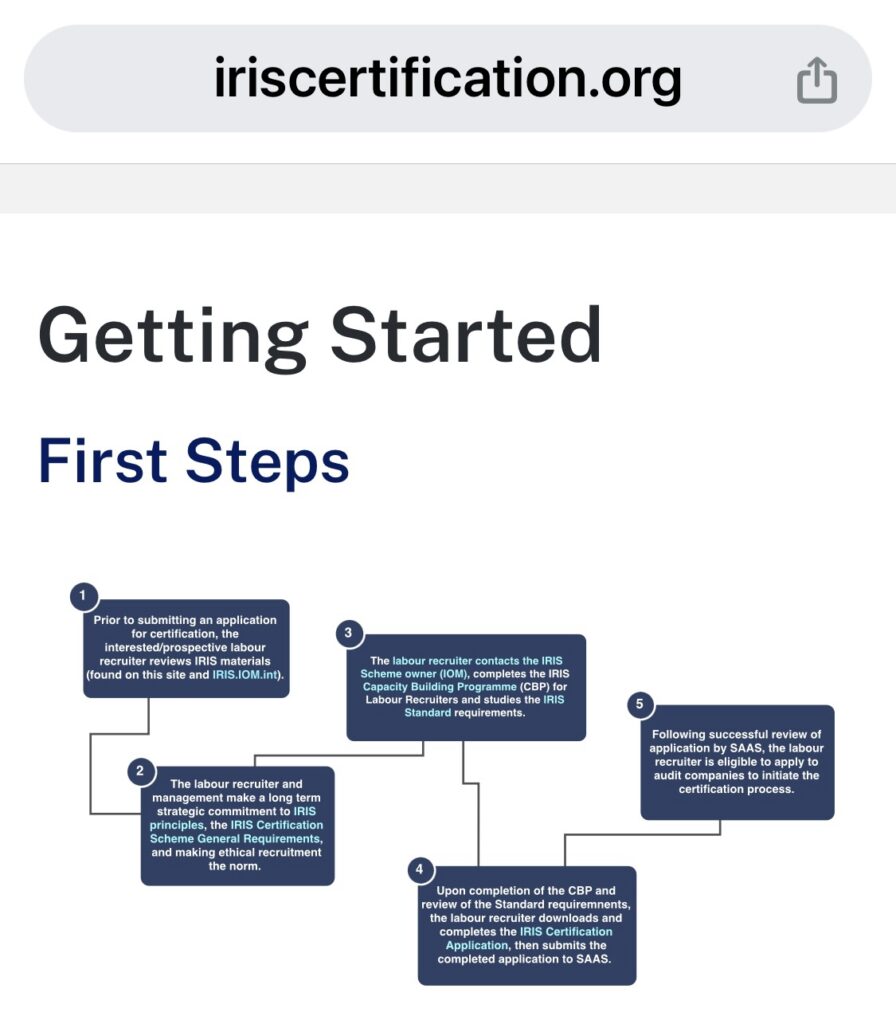
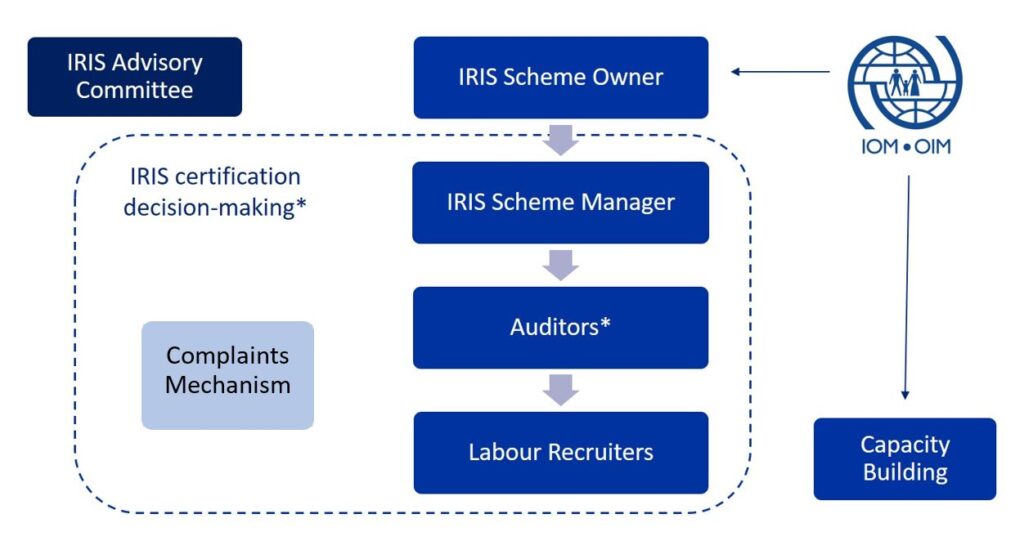
Labour Recruiters participating in the IRIS Certification Program
IRIS shares a list of labour recruiters that have applied for IRIS Certification. As labour recruiters move through the IRIS certification process, each will be listed below, updated as the labour recruiter achieves certification milestones which can be found here.
Below is a list of agencies that are taking part in the IRIS scheme, but it seems none are yet fully certified:
1. International Manpower Recruitment (IMR)
International Manpower Recruitment Pvt. Ltd. (IMR) is an ethical and equitable manpower recruitment company in Nepal. IMR claims it has been supplying human resources globally since 2004.
IMR claims it is a reliable recruitment agency because of its dedication and well-versed team of experts who collaborate to provide a comprehensive and effective service and can cope with every recruitment need. IMR claims it is committed to finding the right person for the right job as per the demand of its valued customers worldwide. IMR claims it aligns with clients and candidates as partners to assist them in fulfilling their human resource requirements by focusing on different methods to eliminate unethical procedures.
On the 25th of October, 2023, IMR announced on its LinkedIn page that IMR has been listed as one of the agencies in the IRIS certification system.
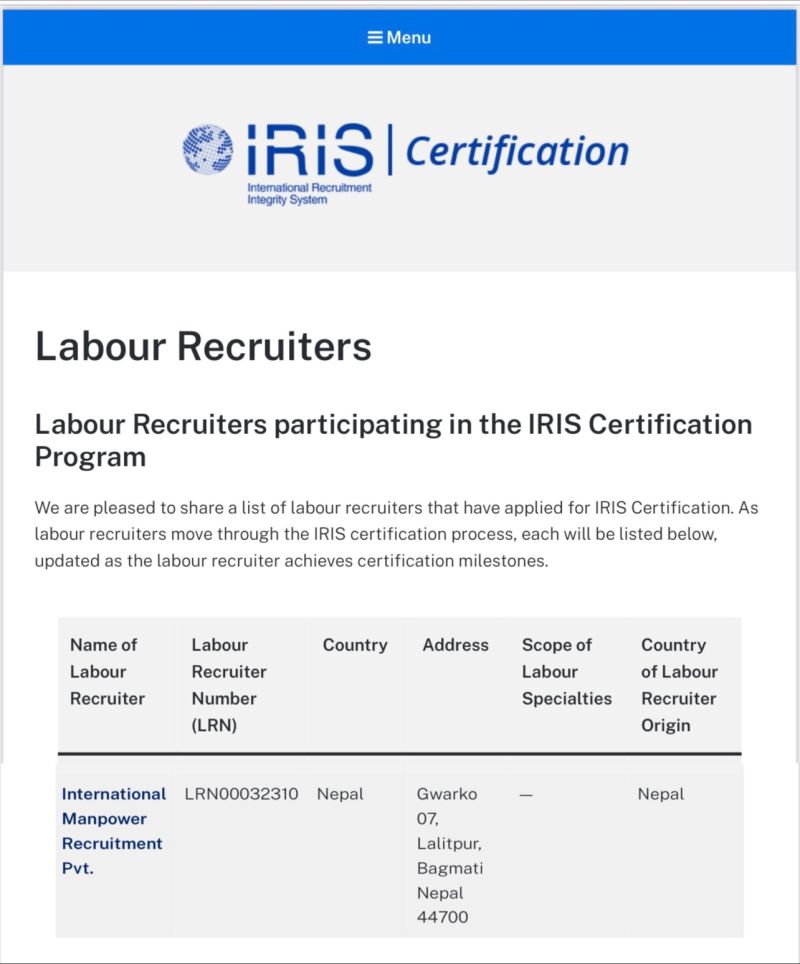
Country of Labour Recruiter Origin – Nepal.
IMR Linkedln page: here.
Website: here.
2. We Are Caring Pte Ltd
We Are Caring Pte Ltd’s mission is to provide ethical solutions to global workforce deployment for the benefit of all – the migrant workers, the employers, and the community. They envision a world in which employment agencies worldwide practice debt-free recruitment by not charging any placement fees or salary deductions to migrant work.
Country of Labour Recruiter Origin – Singapore, Philippines, Indonesia.
See here.
3. IPF Global
IPF Global is a personnel consulting and temporary work agency helping people improve workers lives by offering exceptional work experience. They are committed to understanding the needs of others and providing the support they need in an ever-changing working world.
Country of Labour Recruiter Origin – Poland, Ukraine, Belarus
4. Responsible Business Alliance (RBA) Responsible Recruitment Program (RRP)/Responsible Labour Initiative (RLI) Accreditation Scheme
The Responsible Business Alliance (RBA) is the world’s largest industry coalition dedicated to responsible business conduct in global supply chains.

Founded in 2004 by a group of leading electronics companies, the Responsible Business Alliance (RBA), formerly the Electronic Industry Citizenship Coalition (EICC), is a nonprofit comprised of electronics, retail, auto, and toy companies committed to supporting the rights and well-being of workers and communities worldwide affected by global supply chains. RBA members commit and are held accountable to a standard Code of Conduct and utilize a range of RBA training and assessment tools to support continuous improvement in the social, environmental, and ethical responsibility of their supply chains.
The RBA has a Responsible Recruitment Programme (RRP).
Responsible Recruitment Program
The Responsible Recruitment Program (RRP) claims it is a development path designed for and targeted at private recruitment agencies (PRAs), with potential public recognition for progress to meet ethical recruitment standards of today’s leading industry customers. The program has both training and assessment components.
The key activities of RRP include the submission of a Declaration of Commitment; mandatory attendance of ethical recruitment training; participation in verified self-assessment and, if qualified, demonstrating adherence to ethical recruitment standards through the Specialty Validated Assessment Program (SVAP) on Forced Labor as well as on-going assurance requirements.
The Responsible Recruitment Program (RRP) listing includes the names and locations of private recruitment agencies (PRAs) that participated in the RRP and demonstrated adherence to the minimum requirements for listing (the Participating Level and beyond).
The listing is meant to provide transparency on the maturity level of PRAs that participated in the RRP. Each RRP level comes with increasing expectations on meeting the RBA ethical recruitment standards, including increasing requirements towards implementation of no-fees principle, as outlined in the RBA Code of Conduct and RBA Definition of Fees
Transparency of the maturity level of PRAs in the RRP with increasing ethical recruitment standard requirements
Benefits that a PRA can expect for participating in RRP include:
- Getting on a progressive improvement path to meet ethical recruitment standards
- Meeting increasing customer expectations and sustaining a long-term business relationship
- Differentiating business operations from competitors
- Visibility to RLI member companies
- Gaining public recognition
In 2018, supported by a grant from the Walmart Foundation, the RRP was implemented through the RBA Foundation as part of a project that aims to help break the cycle of exploitation commonly experienced by foreign migrant workers recruited and employed to work in Malaysia. In addition to the RRP, the project aimed to transform the market for responsible employment and recruitment practices through the Responsible Workplace Program (RWP), which builds the awareness of workplace managers and workers on forced labor. Learn more about the RRP and RWP supported by this grant on our RBA Foundation page.
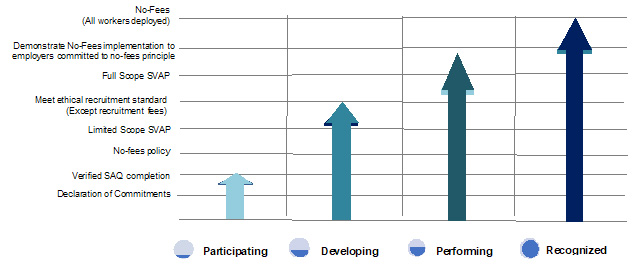
In 2020, the RBA Foundation received another grant from the Walmart Foundation to support a project that promotes safe migration in Malaysia through the transformation of recruitment practices and standards in the supply chain, which includes the continuation of the RRP for another two years, focusing on the Nepal-Malaysia and Indonesia-Malaysia migration corridors. The project also includes several other pilot activities aimed at raising awareness of migrant workers at every stage of their migration journey, as well as the implementation of an economic incentive model for responsible recruitment.
See RRP Listing companies here.
The RRP Listing is updated periodically to reflect the latest progress of the PRAs. However, it appears the agencies listed here are just involved in RRP, and none have been certified yet. None have moved beyond the ‘participating’ stage in the five or more years since the project began.
The list of agencies on the RBA website is confusing. PRAs listed at the Participating Level may ‘not have been audited or have been audited but are working on closing non-conformances.’
Due to the onset of the COVID-19 pandemic, the capacity to conduct assessments on some PRAs during the project period has been impacted, RBA claims, including the ability to access workers for interviews, which is a key part of the assessments. In addition, closure audits may not have been possible during this time.
The RRP Listing is updated periodically to reflect the latest progress of the PRAs. However, the list seems of limited use and reliability, with no objective basis stated as to why an agency is on the list or not.
It is also unclear how agencies join the RRP program, with no objective application process and little understanding of how selection for participation in the Programme has occurred. Many manpower agencies complain that the RBA doesn’t respond to their requests to join the RRP or RLI or get certified under these schemes.
(Updated) From September to December 2023 it was reported that the RBA rushed at the end of its Walmart programme funding period to conduct 2 full RBA SVAP audits on 2 Nepali agencies and several RRP assessments on other Nepali agencies. Other activities may have been carried out but there is no transparent information on this available. It seems RRP funded by Walmart Foundation has now ended, with no certified or recognised agencies at all, more than 6 years after the funding started. RBA website still shows only ‘participating’ agencies and nothing more.
For additional information, contact: RRP@RBAFoundation.orig

Conclusion
Overall, there has been very little progress with recruitment agencies receiving responsible recruitment certification and accreditation schemes in the last few years internationally. Only a few agencies have received certification, with little perceived practical benefit. Progress made has been slow.
The blog post concludes that despite significant international focus, funding and commitments globally to advance ethical recruitment by many parties, there has been little to no progress in the systematic certification of manpower or recruitment agencies as ethical in the past decade or more by any of the key actors working in this area, nor by any of the schemes.
Perhaps an exception to this is the recent On The Level (OTL) Programme by the Fair Hiring Initiative outlined above that has certified 2 Myanmar and 1 Nepali agencies as ethical, and is currently certifying another 9 Nepali agencies (as of Jan 2024). The 1 Nepali agency is listed as ‘qualified for certification’ only.
More concerningly, most of the agencies that have been certified so far as ‘ethical’ report to the author of this post little to no benefit to their business operations since their certification.
We have a long way to go still in ensuring the ethical recruitment of migrant workers and the development of an ethical recruitment market globally.
Andy Hall’s Blogs and on Ethical Recruitment:
See more: Business and Human Rights Resource Centre – How can responsible recruitment of migrant workers move from rhetoric to reality? – Andy Hall.
See more: Electronics Watch – How to Remediate and Prevent Modern Slavery: Advances in Policy, Theory and Practice – Andy Hall.
Additional Reading:

